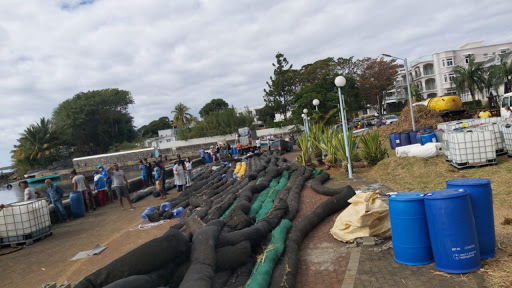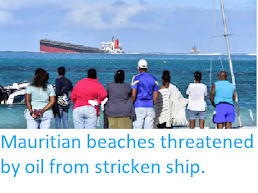A total of eighteen Melon-headed Whales, Peponocephala electra, have been found dead on beaches in Mauritius over the past 24 hours, with about a dozen further Animals in visible distress close to the shore. The deaths widely thought to be linked to the sinking of the MV Wakashio, a Japan-owned, Panama-registered cargo ship which became stranded on a reef off the island on 25 July 2020. The ship began leaking fuel oil shortly after becoming stranded, with all attempts at refloating it failing. It eventually broke up during an attempt to drag it off the reef on 15 August, with the stern section sinking and the bow remaining afloat. The bow section was eventually scuttled (deliberately sunk) on 24 August. Since the initial stranding oil slicks and dead Fish, Turtles, and invertebrates have washed up on many of Mauritius' pristine beaches, reefs, wetlands, and mangroves, but this is the first reported death of Cetaceans following the event, and concerns have been raised that the deaths may have been linked to the decision to scuttle the vessel.
At the time of the stranding the MV Wakashio is believed to have been carrying around 3.8 million litres of a heavy fuel oil blend, VLSFO, over a million litres of which may have escaped into the environment. The specific impacts of VLSFO on marine life are unclear, although oil is potentially harmful to marine life in a variety of ways. Most obviously it can coat the outside of organisms, causing damage to external structures such as the feathers of Birds and fur of Mammals, as well as smothering many marine invertebrates and plants. It also contains a variety of chemicals which can be directly toxic upset the hormonal balance of many animals. Oil also impedes the feeding of marine organisms, coating both food and feeding organs, but provides an excellent food source for Bacteria, which can lead to Eutrophication events - dramatic increases in Bacteria numbers, which then use all the oxygen in the water, leading other organisms to asphyxiate.
The government of Mauritius has been widely accused of failing to respond the the incident with sufficient urgency, with decisions about the handling of the ship and spill being largely left to the ship's owners, Nagashiki Shipping, who are accused of not putting the interests of ordinary Mauritians first, and clean-up efforts onshore being led by a community group, Mobilisation Nationale Wakashio, which formed in response to the incident. Many people in Mauritius suspect the government may be willing to let the size of the incident be downplayed in order to protect the country's tourism industry.
Melon-headed Whales, Peponocephala electra, are considered to be of Least Concern under the terms of the International Union for the Conservation of Nature's Red List of Threatened Species, being widely distributed in the Indian and Pacific Oceans. In Mauritius they are widely known by the alternative name 'Electra Dolphins', and are one of several types of Dolphin that form a popular tourist attraction in the area (along with Bottlenose Dolphins, Tursiops truncatus, Spinner Dolphins, Stenella longirostris, and other species). These small Cetaceans are easily seen from the shore in many areas of Mauritius, and are tolerant of people swimming in the water with them. Melon-headed Whales, are highly social, living in groups of up to 500 individuals, freely mixing with other species, and having even been recorded adopting and looking after orphaned cubs of other types of Dolphins. This makes the species excellent for tourists wishing to interact with Dolphins, but also makes the particularly vulnerable to mass-death incidents and strandings, when large numbers of individuals encounter the same problem at the same time.
See also...



Follow Sciency Thoughts on Facebook.







